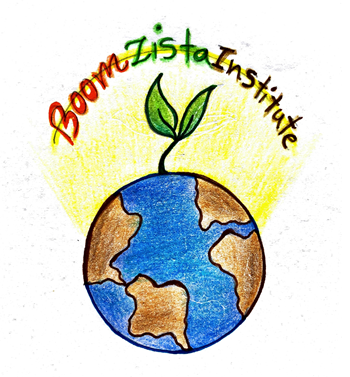Share |




Department of Biodiversity
“We should preserve every scrap of biodiversity as priceless while we learn to use it and come to understand what it means to humanity.”
-E. O. Wilson

One of the original designs for BoomZista Institute logo
Importance
As we, human beings, are busy with our everyday professional life, we do not care about “the health we have”, “the air we breathe”, “the food we eat”, “the water we drink”; all of them are based on biodiversity which is taken for granted. By loss of biodiversity, ecosystem services will be disturbed and consequently our life will be at risk. However, it is worth noting that there need to be more focus on biodiversity preserving efforts addressing the cultural and economical roots of destructive behaviours. For this reason, it is of tremendous importance to help communities understand that “sustainable wealth” can be obtained through biodiversity, which is not comparable with the benefits obtained by profit-seeking (but destructive) activities of human, e.g., deforestation and changing in land use.
What is Biodiversity?
In short, biodiversity contains various lives and their abundance (from unicellular to multicellular organisms), and different ecosystems on our Earth, which has been affected by many factors such as climate change, water and air pollution, deforestation, human overpopulation, habitat destruction, urban planning, invasive species, etc.
Why should we care about ecosystems and biodiversity?
Earth’s ecosystems provide us with materials and energy such as food, fresh water, fuel as well as biochemical, pharmaceutical, and genetic resources; they regulate and maintain various processes, including atmosphere gaseous, climate regulation, controlling erosion, water purification, waste decomposition, diseases management, and so on. Ecosystems are also considered as great sources of inspiration for various arts (e.g., painting, architecture, clothing design, etc.) and technologies. There is a mutual connection between biodiversity and ecosystem natural processes to function properly and provide services on which we depend. “Without biodiversity, there is no future for humanity,” says Prof David Macdonald, at Oxford University.
Aims and Missions
We have an ambitious mission that aims to bring biodiversity and conservation to the forefront of science, policy, and society’s attention. To accomplish this goal, various components need to be considered: helping people with various personal characteristics understand the importance of biodiversity, educating kids and youths, trying to transfer complex scientific data to the young generations and people (in general) with simple words, and collaborating with scientific institutions/university, government agencies, and non-government organizations at the worldwide, country, state/province, and local levels. All the people of different ages and academic levels, including scientists, farmers, industrialists, students, policy makers, individuals from all walks of life, and even kids can power the incredible mission.
Fields of Interests
We are interested in investigating on all the three major components of biodiversity that is made up of ecosystem, species and genetic diversity. This department is trying to increase the knowledge about various kinds of organisms, from the smallest to the biggest and from the simplest to the most complex ones living/present in different ecosystems/conditions, from deep-sea sediments to the atmosphere, and from natural to agricultural ecosystems. We are also interested to find the best ways to transfer this knowledge/science to all the people, including kids, youths and parents.